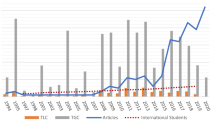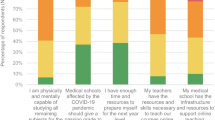Abstract
Online learning has emerged as a significant teaching medium, influencing how higher education is conducted in the U.S. and globally. While widely accepted in select disciplines, distance learning as the method for counselor preparation is often met with skepticism or resistance in the counseling profession. The purpose of this paper is to argue for the confluence of distance and global training in counselor education and training, and to illustrate that confluence through examining the teaching and learning process of doctoral students in a distance PhD program accredited by the U.S. Council for Accreditation of Counseling and Related Educational Programs.
Similar content being viewed by others
References
Albrecht, A. C., & Jones, D. G. (2004). Planning for cyberlearning: A framework for counselor educators. In J. Bloom & G. Walz (Eds.), Cybercounseling and cyberlearning: An encore (pp. 57–77). Greensboro: CAPS.
Chesterton, H. N. (2008). Counselor education supervision: A qualitative comparison of modality and experience. Regent University (Doctoral Dissertation). Retrieved from www.ebsco.com.
Christie, B.S. (1998). Distance clinical supervision in cyberspace: A qualitative study. University of Oregon (Doctoral Dissertation). Retrieved from www.ebsco.com.
Friedman, T. H. (2005). The world is flat. New York: Farrar, Straus and Giroux.
Gerstein, L. H., & Ægisdottir, S. (2007). Training international social change agents: transcending a U.S. counseling paradigm. Counselor Education and Supervision, 47, 123–139.
Granello, P. (2000). Historical context: The relationship of computer technologies and counseling. In J. W. Bloom & G. R. Walz (Eds.), Cybercouneling and cyberlearning: Strategies and resources for the Millennium. Greensboro: CAPS Inc. In association with the ERIC Counseling and Student Services Clearinghouse.
Institute of Higher Education Policy (2000). Quality on the line: Benchmarks for success in Internet-based distance education. Washington, D. C
Lahey, S. (2008). A quantitative examination of distance and traditional education supervision. Regent University (Doctoral Dissertation). Retrieved from www.ebsco.com.
Leong, F. T. L., & Blustein, D. L. (2000). Towards a global vision of counseling psychology. The Counseling Psychologist, 28(1), 5–9.
Leong, F. T. L., & Ponterotto, J. G. (2003). A proposal for internationalizing counseling psychology in the United States: rationale, recommendations, and challenges. The Counseling Psychologist, 31(4), 381–395.
Milgram, S. (1963). Behavioral study of obedience. Journal of Abnormal and Social Psychology, 67, 371–378.
Mkhize, N. (2008). Incorporating indigenous perspectives in counseling psychology (speaking together) keynote address. Chicago: International Congress on Counseling Psychology.
Pedersen, P. B. (2003). Culturally biased assumptions in counseling psychology. The Counseling Psychologist, 31(4), 396–403.
Rovai, A. P., & Lucking, R. A. (2000). Measuring sense of classroom community. Manuscript submitted for publication. Task Force to Explore Opportunities for ACA in Latin America, (2006).
Sells, J. N., Giordano, G. F., Bokar, L., Klein, J. F., Panting, G., & Thumme, B. (2007). The effect of Honduran counseling practices on the North American counseling profession: the power of poverty. Journal of Counseling and Development, 85, 431–439.
Stupart, Y., Rehfuss, M., & Parks-Savage, A. (2010). Counselor supervision in Jamaica: an initial exploration. Journal for International Counselor Education, 2, 74–95. Retrieved from http://diditalcommons.library.unlv.edu/jice.
Thompson, P. A. (2000). A follow-up study comparing the outcomes of the residential and distance learning counselor education graduates of an eastern university. Doctoral Dissertation, University of Sarasota.
Wantz, R. A., Tromski, D. M., Mortsolf, C. J., Yoxtheimer, G., Brill, S., & Cole, A. (2004). Incorporating distance learning into counselor education programs: A research study. In J. W. Bloom & G. R. Walz (Eds.), Cybercounseling & cyberlearning: An encore (pp. 327–344). Greenboro: CAPS.
Wilson, S. E. (2001). The application of technology to counselor education: Video conferencing in distance supervision. San Antonio: Doctoral dissertation, University of Texas.
Wren, G. (1962). The culturally encapsulated counselor. Harvard Educational Review, 32, 444–449.
Author information
Authors and Affiliations
Corresponding author
Rights and permissions
About this article
Cite this article
Sells, J., Tan, A., Brogan, J. et al. Preparing International Counselor Educators Through Online Distance Learning. Int J Adv Counselling 34, 39–54 (2012). https://doi.org/10.1007/s10447-011-9126-4
Published:
Issue Date:
DOI: https://doi.org/10.1007/s10447-011-9126-4




